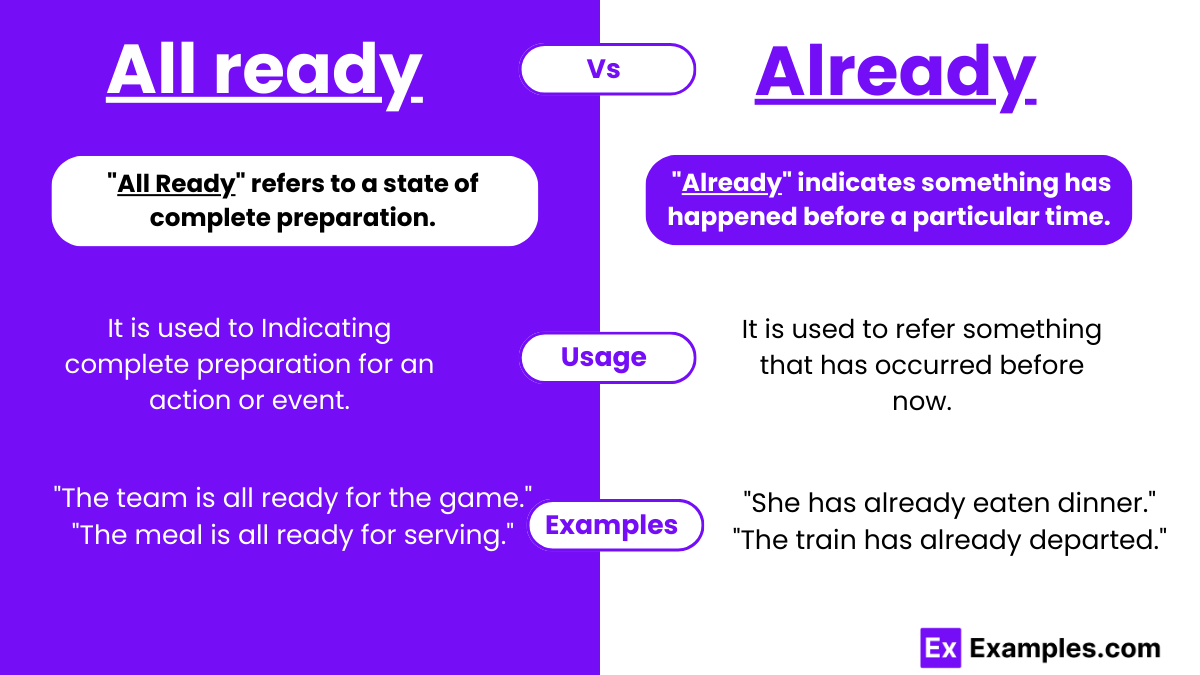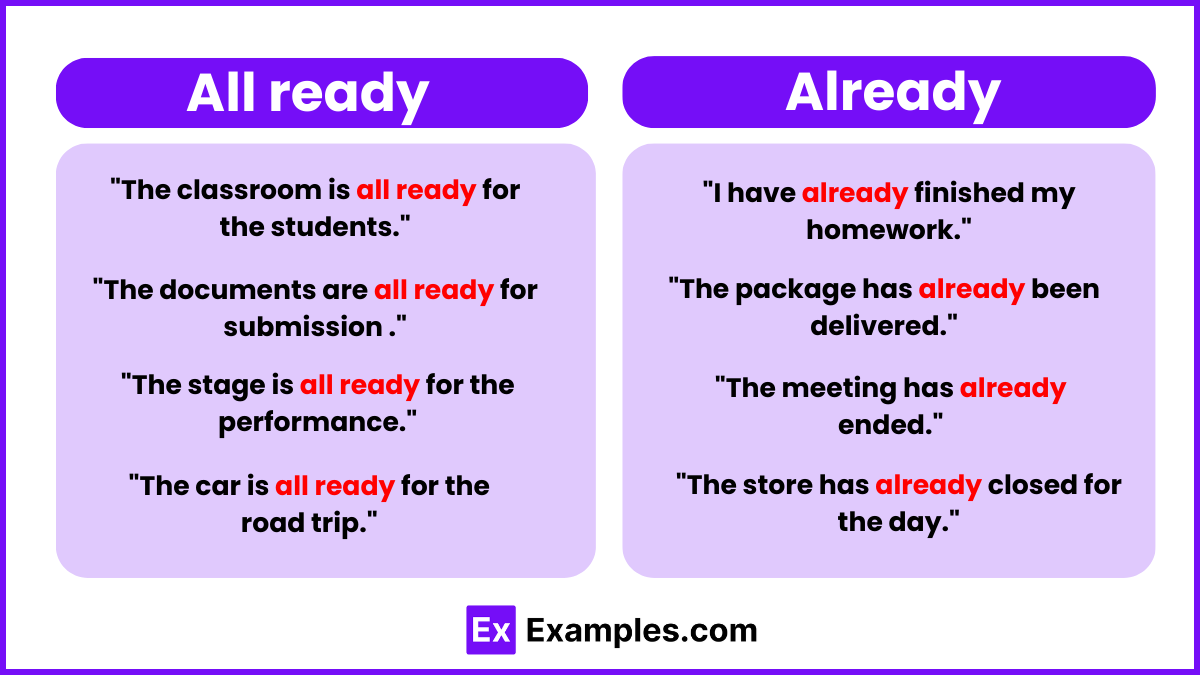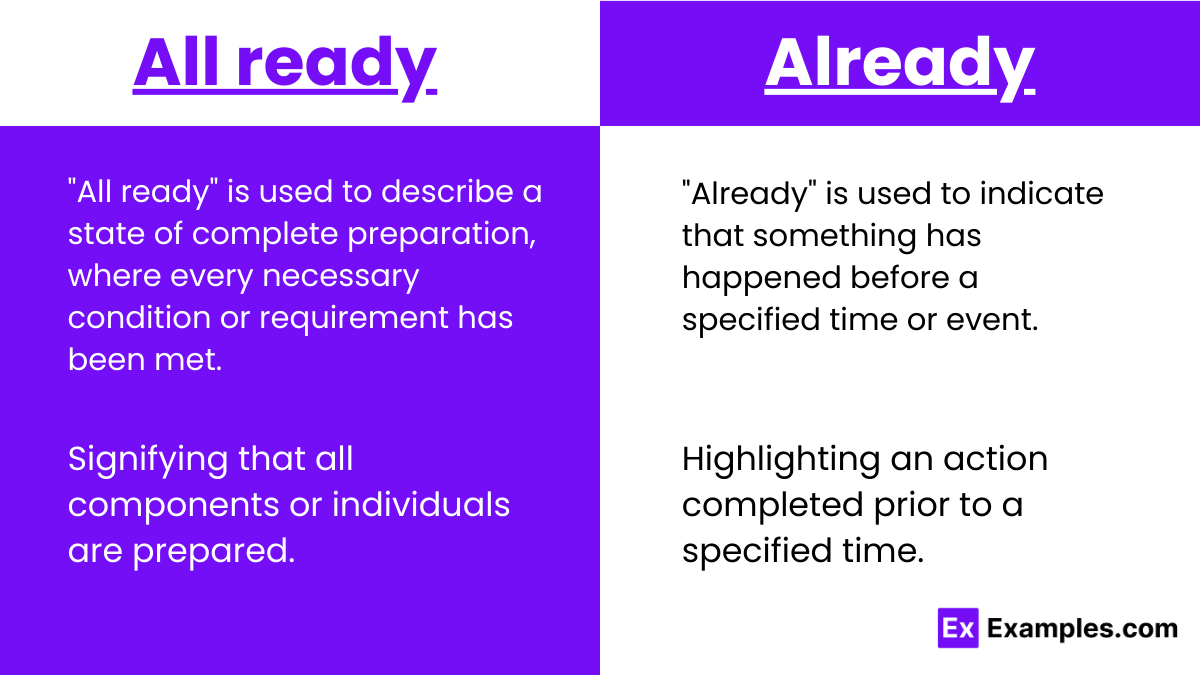All ready vs Already – Examples, Differences, Usage, Tips, PDF
The journey of distinguishing “All Ready” from “Already” opens up a fascinating chapter of English language nuances tailored for students aiming to refine their expression. “Already” serves as a temporal marker, signifying actions or conditions that have occurred at an earlier point in time, thus anchoring statements in a pre-established context. It’s the word you reach for when indicating that a deed is completed, a milestone achieved, or a change has already taken effect, underscoring the notion of prior completion or existence.
Conversely, “All Ready” paints a picture of thorough preparedness, where every element or individual is in perfect alignment for an impending action or event. It encapsulates a comprehensive state of readiness, ensuring that nothing is amiss or left to chance. Whether it’s the final checks before a performance, the last-minute preparations for a significant event, or simply confirming that a group is set to embark on an adventure, “All Ready” implies a collective or complete state of readiness, emphasizing a holistic preparedness that “Already” does not convey.
All ready and Already – Meanings
All Ready: All Ready refers to a state of complete preparation, where every necessary condition or requirement has been met and everything is in place for a particular action or event to occur. The phrase emphasizes thoroughness and readiness, encompassing all components or individuals involved. It is often used to indicate that a group of people, items, or circumstances are fully prepared for what is next, signifying collective readiness without any remaining tasks or preparations needed.
Already: Already is an adverb that denotes that something has occurred before a specified or implied time, often used to express surprise that an event has happened sooner than expected or to state that an action or condition has been completed prior to the current moment. It implies a time aspect and is used to clarify that something has taken place in the past, reinforcing the notion of prior occurrence, completion, or existence, without necessarily relating to readiness or preparation.
Summary
“All Ready” underscores a holistic state of preparedness, where all components or individuals are set for an impending action or event. While both expressions hint at readiness, “Already” focuses on temporal precedence, and “All Ready” on the comprehensive arrangement and readiness for future endeavour’s, each serving distinct narrative functions based on context and temporal focus. “Already” signals that an action or fact was established before a certain point in time, emphasizing prior occurrence or completion. It’s the term you’d choose to highlight that something has unfolded or been realized ahead of the present moment.
Difference Between All ready and Already
Distinguishing “All Ready” from “Already” is crucial for accurate expression, especially in writing.
| Aspect | All Ready | Already |
|---|---|---|
| Definition | Fully prepared | Prior to a specified time |
| Usage | Describes complete readiness | Indicates prior occurrence |
| Context | Preparatory situations | Temporal situations |
| Grammar | Phrase (adjective + adverb) | Adverb |
| Examples | “We are all ready to go.” | “He’s already left.” |
| Connotation | Readiness of elements | Prior completion |
| Synonyms | Fully prepared, set | Previously, before |
| Phrase Structure | Two words | Single word |
| Function | Descriptive | Temporal |
| Common Mistakes | Misused for already | Misused for all ready. |
Examples of All ready and Already
Understanding “All Ready” and “Already” through examples clarifies their distinct contexts and proper usage.
All Ready Examples:
- The team was all ready for the championship game.
- Dinner is all ready; we can start eating now.
- Are we all ready to proceed with the meeting?
- The students were all ready for the field trip.
- She had her bags packed and was all ready to leave.
Already Examples:
- I’ve already completed the assignment.
- They had already left by the time we arrived.
- She’s already seen that movie.
- The event had already started when we got there.
- He’s already eaten lunch.
When to Use All ready and Already
Choosing between “All Ready” and “Already” hinges on context; here’s when to use each:
- Usage of “All Ready”:
- Indicating complete preparation for an action or event.
- Signifying that all components or individuals are prepared.
- Usage of “Already”:
- Referring to something that has occurred before now.
- Highlighting an action completed prior to a specified time.
Points to remember when using Already and All Ready
When using “Already” and “All Ready,” keep these points in mind:
- Context Matters: Use “Already” for time-related references and “All Ready” for readiness.
- Grammatical Role: “Already” is an adverb; “All Ready” is a phrase combining an adjective and adverb.
- Temporal vs. Preparatory: “Already” implies prior occurrence; “All Ready” implies complete preparation.
- Sentence Placement: “Already” often appears mid-sentence; “All Ready” typically precedes the verb.
- Synonym Check: Substitute “previously” for “Already” and “fully prepared” for “All Ready” to test correctness.
- Avoid Redundancy: Ensure “All Ready” is necessary; don’t use it if “ready” suffices.
- Clarity is Key: Choose the word that best clarifies your intended meaning without ambiguity.
- Proofread: Double-check your usage to ensure you’ve selected the appropriate term.
Similarities between Already and All Ready
While “Already” and “All Ready” are used in different contexts, they share some similarities:
- English Language: Both are terms used in the English language to convey readiness or the completion of an action.
- Auditory Similarity: They sound similar when spoken, which can lead to confusion in oral communication.
- Relation to Time and Preparation: Each term, in its own way, relates to a concept of timing — “Already” with actions completed before a specific time, and “All Ready” with preparedness at a particular moment.
- Usage in Sentences: Both can be used to modify verbs in sentences, although they serve different grammatical functions (“Already” as an adverb and “All Ready” as a phrase).
- Expressing Completeness: Each term, albeit in distinct contexts, conveys a sense of completeness — “Already” indicates that something has been completed, and “All Ready” that preparations are complete.
Tips for Already and All Ready
Tips for Already and All Ready are as follows:
- Temporal vs. Preparatory: Use “Already” for actions completed in the past, and “All Ready” when everything or everyone is prepared.
- Grammatical Function: Remember, “Already” is an adverb, fitting into sentences to modify verbs, while “All Ready” is a phrase, describing a state of readiness.
- Test with Synonyms: Substitute “Already” with “previously” and “All Ready” with “fully prepared” to check if your sentence still makes sense.
- Context Clues: Pay attention to the sentence context; “Already” often indicates surprise or confirmation, whereas “All Ready” implies a check for readiness.
- Sound It Out: Although they sound similar, their meanings are distinct. Read your sentence out loud to ensure it conveys the intended message.
- Double-Check: Especially in writing, review your usage of “Already” and “All Ready” to avoid common mistakes due to their auditory similarity.
- Practice Examples: Regularly practice with examples of both terms to internalize their differences and become more confident in using them correctly.
- Peer Review: If unsure, have someone else read your work. Fresh eyes can help catch mistakes and clarify usage.
Exercise for Already and All Ready
- We were ___ set to start the project, but we realized we needed more supplies.
- She had ___ seen the movie, so she decided to read a book instead.
- The guests were ___ at the door, waiting for the event to begin.
- Had you ___ finished your homework when I called?
- The team was ___ for the challenge, with all the preparations done.
- I can’t believe the semester is ___ over; it feels like it just started.
- Were you ___ aware of the change in schedule?
- The children were ___ in their costumes, excited for the performance.
- He had ___ left the office by the time I arrived.
- They were ___ for the trip, with bags packed and itineraries printed
FAQs
Is It Correct to Say Already?
Yes, using “already” is correct when referring to something that has happened before a specific time or sooner than expected. It emphasizes the completion of an action in the past.
Can I Use Already with Past Tense?
Yes, “already” can be used with the past tense to indicate that an action was completed before a certain time in the past, often suggesting a degree of surprise or affirmation.
What Is the Rule for Already?
The rule for “already” is to use it to indicate that something has happened before a specific time or earlier than anticipated. It’s commonly used in perfect tenses but can also be used with simple past.
Can You Start a Sentence with Already?
Yes, you can start a sentence with “already” for emphasis or to draw attention to the timing of an action, especially in informal or conversational contexts.





